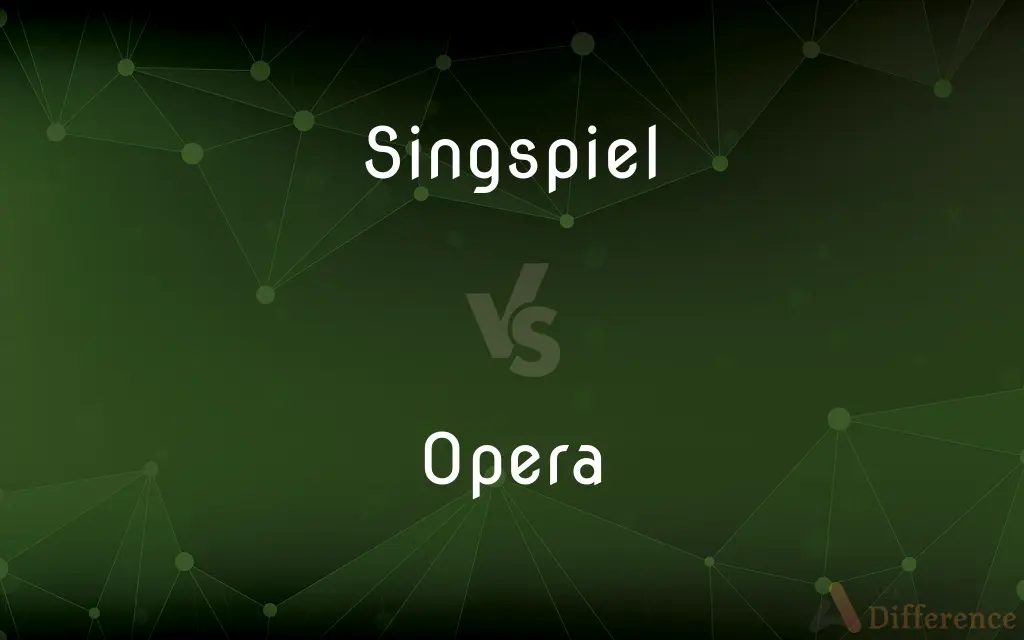Singspiel vs. Opera — What's the Difference?
By Tayyaba Rehman & Fiza Rafique — Updated on March 30, 2024
Singspiel is a form of German light opera, notable for its spoken dialogue and simple, catchy melodies, whereas opera combines music, drama, and usually continuous singing without spoken dialogue.

Difference Between Singspiel and Opera
Table of Contents
ADVERTISEMENT
Key Differences
Singspiel, a genre that emerged in the 18th century, is characterized by its mixture of sung arias and ensembles with substantial spoken dialogue. It often tackles light or folk themes, making it accessible to a broad audience. Opera, on the other hand, is a comprehensive art form that originated in the late 16th century, combining orchestral music, vocal pieces (such as arias, duets, and choruses), acting, and sometimes dance. Operas are typically through-composed, meaning they feature continuous musical and vocal performance without spoken dialogue, and they often explore more complex and dramatic themes.
While singspiel is predominantly a German tradition, opera has its roots in Italian culture but has become a global phenomenon, with variations and styles developed in many countries. Singspiel's accessibility and focus on lighter themes made it especially popular among middle-class audiences, whereas opera has often been associated with more elite social circles, due to its grandiose productions and sophisticated musical arrangements.
The musical style of singspiel tends to be simple and direct, aiming to appeal to the emotions and sensibilities of a wide audience. In contrast, opera can range from the baroque complexity and ornamentation of Handel or the classical clarity of Mozart, to the dramatic intensity of Wagner or Verdi, showcasing a wide spectrum of musical expression.
Another significant difference lies in the production scale and performance venues. Singspiels were traditionally performed in smaller venues or even outdoors, contributing to their more intimate and informal atmosphere. Operas are typically staged in large opera houses, equipped to handle their elaborate sets, costumes, and orchestral requirements, contributing to the grandeur and immersive experience of opera.
While both forms have evolved over time, opera has seen a wider range of evolution, incorporating various musical styles and theatrical innovations. Singspiel remains a cherished genre within German-speaking countries, preserving its traditional charm, whereas opera continues to adapt and thrive worldwide, attracting diverse audiences with its rich blend of music, drama, and visual art.
ADVERTISEMENT
Comparison Chart
Origin
18th century Germany
Late 16th century Italy
Key Features
Spoken dialogue, simple melodies
Continuous singing, complex music
Themes
Light, folk
Dramatic, historical, mythical
Audience
Broad, middle-class
Often elite, sophisticated
Musical Style
Simple, catchy
Varied, from baroque to modern
Performance Scale
Smaller venues, intimate
Large opera houses, elaborate productions
Cultural Reach
Primarily German-speaking countries
Global
Compare with Definitions
Singspiel
Combines music with spoken word for storytelling.
Singspiel often incorporates folk tales and humor.
Opera
Performed without spoken dialogue, except in specific subgenres.
Traditional opera relies entirely on music to convey the story.
Singspiel
Features both sung and spoken performances.
Characters in a singspiel sing arias and engage in spoken dialogue.
Opera
Features complex musical compositions and vocal performances.
Opera employs intricate arias, duets, and orchestral scores.
Singspiel
Predominantly performed in German.
Singspiel maintains its cultural roots with performances in the German language.
Opera
A fully sung dramatic work combining music, theater, and sometimes dance.
Puccini's La Bohème showcases opera's emotional depth.
Singspiel
A German light opera with spoken dialogue.
Mozart's The Magic Flute is a celebrated example of singspiel.
Opera
Explores a wide range of themes, including tragedy and comedy.
Verdi's Rigoletto illustrates opera's dramatic potential.
Singspiel
Accessible and entertaining to a wide audience.
Singspiel's catchy melodies and simple stories appeal broadly.
Opera
A global art form with a rich history of innovation.
Opera has evolved from its Italian origins to include diverse styles worldwide.
Singspiel
A Singspiel (German pronunciation: [ziŋɡʃpiːl]; plural: Singspiele; literally "sing-play") is a form of German-language music drama, now regarded as a genre of opera. It is characterized by spoken dialogue, which is alternated with ensembles, songs, ballads, and arias which were often strophic, or folk-like.
Opera
Opera is a form of theatre in which music is a fundamental component and dramatic roles are taken by singers, but is distinct from musical theatre. Such a "work" (the literal translation of the Italian word "opera") is typically a collaboration between a composer and a librettist and incorporates a number of the performing arts, such as acting, scenery, costume, and sometimes dance or ballet.
Singspiel
A German musical comedy of the 1700s featuring songs and ensembles interspersed with dialogue.
Opera
A theatrical presentation in which a dramatic performance is set to music.
Singspiel
An early German form of opera consisting of spoken dialogue interspersed with song.
Opera
The score of such a work.
Singspiel
An opera in this style.
Opera
A theater designed primarily for operas.
Singspiel
A dramatic work, partly in dialogue and partly in song, of a kind popular in Germany in the latter part of the 18th century. It was often comic, had modern characters, and patterned its music on folk song with strictly subordinated accompaniment.
Opera
A plural of opus.
Opera
A creative work, especially a musical composition numbered to designate the order of a composer's works.
Opera
(music) A theatrical work, combining drama, music, song and sometimes dance.
Opera
(music) The score for such a work.
Opera
A building designed for the performance of such works; an opera house.
Opera
A company dedicated to performing such works.
Opera
(by extension) Any showy, melodramatic or unrealistic production resembling an opera.
Opera
Plural of opus; a collection of work.
Opera
A drama, either tragic or comic, of which music forms an essential part; a drama wholly or mostly sung, consisting of recitative, arias, choruses, duets, trios, etc., with orchestral accompaniment, preludes, and interludes, together with appropriate costumes, scenery, and action; a lyric drama.
Opera
The score of a musical drama, either written or in print; a play set to music.
Opera
The house where operas are exhibited.
Opera
A drama set to music; consists of singing with orchestral accompaniment and an orchestral overture and interludes
Opera
Theater where opera is performed
Common Curiosities
How does the music in singspiel compare to that in opera?
Singspiel music tends to be simpler and more direct, aiming for broad appeal, while opera encompasses a wide range of musical complexity and expression.
Can opera include any spoken dialogue?
While traditional opera is primarily sung, some specific subgenres and modern compositions might incorporate spoken dialogue.
What distinguishes singspiel from opera?
Singspiel features spoken dialogue interspersed with music, focusing on lighter themes, whereas opera is through-sung with a focus on complex musical and dramatic narratives.
Do singspiel and opera use the same types of voices?
Both genres utilize classical vocal techniques, but opera often demands a wider range of vocal prowess due to its complex musical compositions.
Is singspiel still popular today?
Singspiel remains a cherished genre in German-speaking regions, celebrated for its historical significance and accessible charm.
Where is opera performed?
Opera is performed in opera houses and theaters equipped with the stage and acoustic design necessary for grand productions.
Why are operas often associated with elite audiences?
Opera's association with elite audiences stems from its history of elaborate productions, sophisticated music, and themes that appealed to aristocratic tastes.
What is a famous example of singspiel?
Mozart's "The Magic Flute" is one of the most famous examples of singspiel, known for its enchanting music and spoken dialogue.
How has opera evolved over time?
Opera has evolved to include a variety of styles, from the baroque to the contemporary, incorporating technological and thematic innovations.
What role do composers play in both genres?
Composers are central to both genres, crafting the music that defines the works, though their approaches differ to suit the stylistic demands of each genre.
Share Your Discovery

Previous Comparison
Drive vs. Enthusiasm
Next Comparison
Haven vs. SanctuaryAuthor Spotlight
Written by
Tayyaba RehmanTayyaba Rehman is a distinguished writer, currently serving as a primary contributor to askdifference.com. As a researcher in semantics and etymology, Tayyaba's passion for the complexity of languages and their distinctions has found a perfect home on the platform. Tayyaba delves into the intricacies of language, distinguishing between commonly confused words and phrases, thereby providing clarity for readers worldwide.
Co-written by
Fiza RafiqueFiza Rafique is a skilled content writer at AskDifference.com, where she meticulously refines and enhances written pieces. Drawing from her vast editorial expertise, Fiza ensures clarity, accuracy, and precision in every article. Passionate about language, she continually seeks to elevate the quality of content for readers worldwide.














































